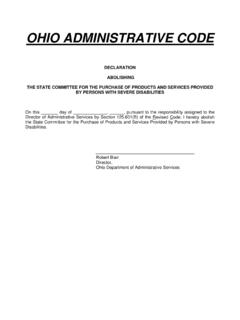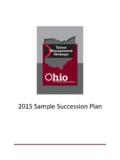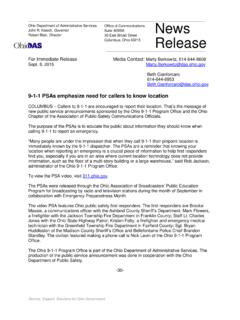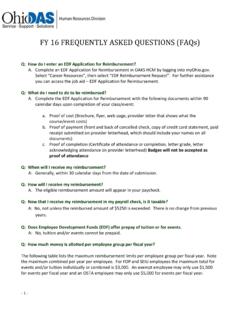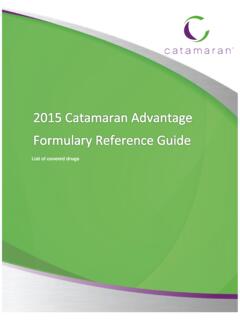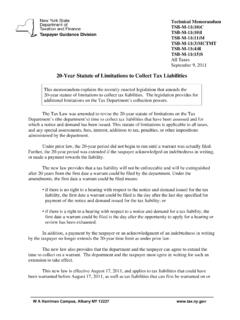Transcription of Title VII of the Civil Rights Act of 1964
1 The Equal Employment Opportunity Commission Title VII of the Civil Rights Act of 1964. EDITOR'S NOTE: The following is the text of Title VII of the Civil Rights Act of 1964 (Pub. L. 88-352) ( Title VII), as amended, as it appears in volume 42 of the United States Code, beginning at section 2000e. Title VII prohibits employment discrimination based on race, color, religion, sex and national origin. The Civil Rights Act of 1991 (Pub. L. 102-166) (CRA) amends several sections of Title VII. These amendments appear in boldface type. In addition, section 102 of the CRA (which is printed elsewhere in this publication) amends the Revised Statutes by adding a new section following section 1977 (42. 1981), to provide for the recovery of compensatory and punitive damages in cases of intentional violations of Title VII, the Americans with Disabilities Act of 1990, and section 501 of the Rehabilitation Act of 1973. Cross references to Title VII as enacted appear in italics following each section heading.
2 Editor's notes also appear in italics. An Act To enforce the constitutional right to vote, to confer jurisdiction upon the district courts of the United States to provide injunctive relief against discrimination in public accommodations, to authorize the attorney General to institute suits to protect constitutional Rights in public facilities and public education, to extend the Commission on Civil Rights , to prevent discrimination in federally assisted programs, to establish a Commission on Equal Employment Opportunity, and for other purposes. Be it enacted by the Senate and House of Representatives of the United States of America in Congress assembled, That this Act may be cited as the " Civil Rights Act of 1964". DEFINITIONS. The Equal Employment Opportunity Commission Title VII of the Civil Rights Act of 1964. SEC. 2000e. [Section 701]. For the purposes of this subchapter- (a) The term ``person'' includes one or more individuals, governments, governmental agencies, political subdivisions, labor unions, partnerships, associations, corporations, legal representatives, mutual companies, jointstock companies, trusts, unincorporated organizations, trustees, trustees in cases under Title 11 [bankruptcy], or receivers.
3 (b) The term ``employer'' means a person engaged in an industry affecting commerce who has fifteen or more employees for each working day in each of twenty or more calendar weeks in the current or preceding calendar year, and any agent of such a person, but such term does not include (1) the United States, a corporation wholly owned by the Government of the United States, an Indian tribe, or any department or agency of the District of Columbia subject by statute to procedures of the competitive service (as defined in section 2102 of Title 5 [of the United States Code]), or (2) a bona fide private membership club (other than a labor organization). which is exempt from taxation under section 501(c) of Title 26 [the Internal Revenue Code of 1954], except that during the first year after March 24, 1972 [the date of enactment of the Equal Employment Opportunity Act of 1972], persons having fewer than twentyfive employees (and their agents) shall not be considered employers.
4 (c) The term ``employment agency'' means any person regularly undertaking with or without compensation to procure employees for an employer or to procure for employees opportunities to work for an employer and includes an agent of such a person. (d) The term ``labor organization'' means a labor organization engaged in The Equal Employment Opportunity Commission Title VII of the Civil Rights Act of 1964. an industry affecting commerce, and any agent of such an organization, and includes any organization of any kind, any agency, or employee representation committee, group, association, or plan so engaged in which employees participate and which exists for the purpose, in whole or in part, of dealing with employers concerning grievances, labor disputes, wages, rates of pay, hours, or other terms or conditions of employment, and any conference, general committee, joint or system board, or joint council so engaged which is subordinate to a national or international labor organization.
5 (e) A labor organization shall be deemed to be engaged in an industry affecting commerce if (1) it maintains or operates a hiring hall or hiring office which procures employees for an employer or procures for employees opportunities to work for an employer, or (2) the number of its members (or, where it is a labor organization composed of other labor organizations or their representatives, if the aggregate number of the members of such other labor organization) is (A) twentyfive or more during the first year after March 24, 1972 [the date of enactment of the Equal Employment Opportunity Act of 1972], or (B) fifteen or more thereafter, and such labor organization- (1) is the certified representative of employees under the provisions of the National Labor Relations Act, as amended [29 151 et seq.], or the Railway Labor Act, as amended [45 151. et seq.];. (2) although not certified, is a national or international labor organization or a local labor organization recognized or acting as the representative of employees of an employer or employers engaged in an industry affecting commerce; or (3) has chartered a local labor organization or subsidiary body The Equal Employment Opportunity Commission Title VII of the Civil Rights Act of 1964.
6 Which is representing or actively seeking to represent employees of employers within the meaning of paragraph (1) or (2); or (4) has been chartered by a labor organization representing or actively seeking to represent employees within the meaning of paragraph (1) or (2) as the local or subordinate body through which such employees may enjoy membership or become affiliated with such labor organization; or (5) is a conference, general committee, joint or system board, or joint council subordinate to a national or international labor organization, which includes a labor organization engaged in an industry affecting commerce within the meaning of any of the preceding paragraphs of this subsection. (f) The term ``employee'' means an individual employed by an employer, except that the term ``employee'' shall not include any person elected to public office in any State or political subdivision of any State by the qualified voters thereof, or any person chosen by such officer to be on such officer's personal staff, or an appointee on the policy making level or an immediate adviser with respect to the exercise of the constitutional or legal powers of the office.
7 The exemption set forth in the preceding sentence shall not include employees subject to the Civil service laws of a State government, governmental agency or political subdivision. With respect to employment in a foreign country, such term includes an individual who is a citizen of the United States. (g) The term ``commerce'' means trade, traffic, commerce, transportation, transmission, or communication among the several States;. or between a State and any place outside thereof; or within the District of Columbia, or a possession of the United States; or between points in the same State but through a point outside thereof. The Equal Employment Opportunity Commission Title VII of the Civil Rights Act of 1964. (h) The term ``industry affecting commerce'' means any activity, business, or industry in commerce or in which a labor dispute would hinder or obstruct commerce or the free flow of commerce and includes any activity or industry ``affecting commerce'' within the meaning of the LaborManagement Reporting and Disclosure Act of 1959 [29 401 et seq.]
8 ], and further includes any governmental industry, business, or activity. (i) The term ``State'' includes a State of the United States, the District of Columbia, Puerto Rico, the Virgin Islands, American Samoa, Guam, Wake Island, the Canal Zone, and Outer Continental Shelf lands defined in the Outer Continental Shelf Lands Act [43 1331 et seq.]. (j) The term ``religion'' includes all aspects of religious observance and practice, as well as belief, unless an employer demonstrates that he is unable to reasonably accommodate to an employee's or prospective employee's religious observance or practice without undue hardship on the conduct of the employer's business. (k) The terms ``because of sex'' or ``on the basis of sex'' include, but are not limited to, because of or on the basis of pregnancy, childbirth, or related medical conditions; and women affected by pregnancy, childbirth, or related medical conditions shall be treated the same for all employmentrelated purposes, including receipt of benefits under fringe benefit programs, as other persons not so affected but similar in their ability or inability to work, and nothing in section 2000e-2(h) of this Title [section 703(h)] shall be interpreted to permit otherwise.
9 This subsection shall not require an employer to pay for health insurance benefits for abortion, except where the life of the mother would be endangered if the fetus were carried to term, or except where medical complications have arisen from an abortion: Provided, That nothing herein shall preclude an employer from providing abortion benefits or otherwise The Equal Employment Opportunity Commission Title VII of the Civil Rights Act of 1964. affect bargaining agreements in regard to abortion. (l) The term ``complaining party'' means the Commission, the Attorney General, or a person who may bring an action or proceeding under this subchapter. (m) The term ``demonstrates'' means meets the burdens of production and persuasion. (n) The term ``respondent'' means an employer, employment agency, labor organization, joint labormanagement committee controlling apprenticeship or other training or retraining program, including an onthejob training program, or Federal entity subject to section 2000e-16 of this Title .
10 EXEMPTION. SEC. 2000e-1. [Section 702]. (a) This subchapter shall not apply to an employer with respect to the employment of aliens outside any State, or to a religious corporation, association, educational institution, or society with respect to the employment of individuals of a particular religion to perform work connected with the carrying on by such corporation, association, educational institution, or society of its activities. (b) It shall not be unlawful under section 2000e-2 or 2000e-3 of this Title [section 703 or 704] for an employer (or a corporation controlled by an employer), labor organization, employment agency, or joint labormanagement committee controlling apprenticeship or other training or retraining (including onthejob training programs). The Equal Employment Opportunity Commission Title VII of the Civil Rights Act of 1964. to take any action otherwise prohibited by such section, with respect to an employee in a workplace in a foreign country if compliance with such section would cause such employer (or such corporation), such organization, such agency, or such committee to violate the law of the foreign country in which such workplace is located.
